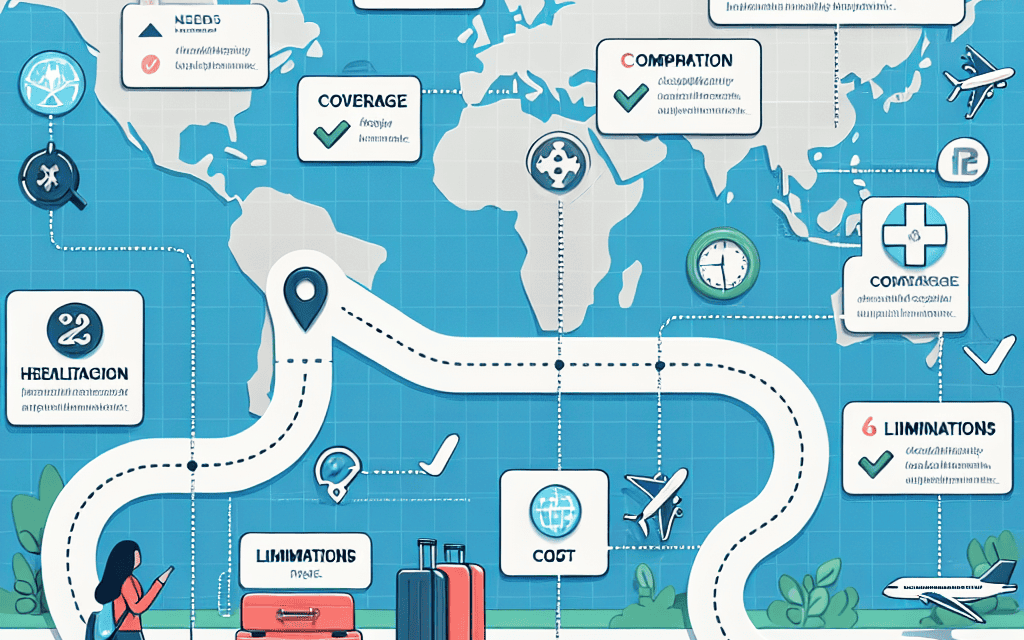“Travel Smart, Insure Right: Your Health’s Global Safety Net”
Introduction
Determining the right amount of international travel health insurance is a crucial step for any traveler venturing beyond their home country’s borders. As global travel becomes increasingly accessible, ensuring adequate health coverage is essential to safeguard against unforeseen medical emergencies that can arise while abroad. The complexities of healthcare systems in different countries, coupled with the potential for high medical costs, make it imperative for travelers to carefully assess their insurance needs. This involves evaluating factors such as the destination’s healthcare infrastructure, the duration and nature of the trip, personal health conditions, and the level of risk associated with planned activities. By understanding these elements, travelers can make informed decisions about the extent of coverage required, ensuring peace of mind and financial protection during their international journeys.
Understanding the Basics of International Travel Health Insurance
When planning an international trip, one of the most crucial considerations is securing adequate travel health insurance. Understanding the basics of international travel health insurance is essential to ensure that you are adequately protected against unforeseen medical expenses while abroad. This type of insurance is designed to cover medical emergencies, hospitalizations, and sometimes even medical evacuations, which can be exorbitantly expensive without proper coverage. Therefore, determining the right amount of international travel health insurance is a vital step in your travel preparations.
To begin with, it is important to assess the specific health risks associated with your travel destination. Different countries have varying levels of healthcare infrastructure, and the cost of medical services can differ significantly. For instance, healthcare in the United States is notoriously expensive, whereas some European countries offer more affordable options. Consequently, understanding the healthcare landscape of your destination can help you gauge the level of coverage you might need. Additionally, consider any activities you plan to engage in during your trip. Adventurous activities such as skiing, scuba diving, or hiking in remote areas may require additional coverage due to the increased risk of injury.
Moreover, it is essential to evaluate your personal health needs and pre-existing conditions. Some insurance policies may not cover pre-existing conditions, or they may require an additional premium. Therefore, it is crucial to read the policy details carefully and ensure that your specific health needs are addressed. Furthermore, consider the duration of your trip. Longer trips may necessitate more comprehensive coverage, as the likelihood of encountering a medical issue increases with time.
In addition to these considerations, it is wise to compare different insurance providers and their offerings. Policies can vary widely in terms of coverage limits, exclusions, and premiums. By comparing multiple options, you can find a policy that offers the best balance between cost and coverage. It is also beneficial to read reviews and seek recommendations from fellow travelers to gauge the reliability and customer service of potential insurers.
Another important aspect to consider is the level of emergency assistance provided by the insurance policy. In the event of a medical emergency, having access to a 24/7 helpline and assistance with medical evacuations can be invaluable. Some policies also offer additional benefits such as trip interruption coverage, lost luggage reimbursement, and coverage for travel delays. These added features can provide peace of mind and financial protection against a range of travel-related issues.
Furthermore, it is advisable to check if your existing health insurance offers any international coverage. Some domestic health insurance plans may provide limited coverage for overseas travel, which could reduce the amount of additional insurance you need to purchase. However, it is important to verify the extent of this coverage and any limitations that may apply.
In conclusion, determining the right amount of international travel health insurance requires careful consideration of various factors, including your destination, personal health needs, trip duration, and the specific activities you plan to undertake. By thoroughly evaluating these elements and comparing different insurance options, you can ensure that you are adequately protected against potential medical expenses while traveling abroad. Ultimately, investing in the right travel health insurance policy can provide invaluable peace of mind, allowing you to focus on enjoying your international adventure.
Factors Influencing the Cost of Travel Health Insurance
When planning an international trip, one of the most crucial considerations is securing adequate travel health insurance. The cost of this insurance can vary significantly, influenced by a multitude of factors that travelers should carefully evaluate to ensure they are adequately covered without overspending. Understanding these factors can help travelers make informed decisions, balancing cost with the level of coverage needed for their specific circumstances.
Firstly, the destination plays a pivotal role in determining the cost of travel health insurance. Countries with high healthcare costs, such as the United States or Switzerland, typically result in higher insurance premiums. Conversely, traveling to countries with more affordable healthcare systems may lead to lower insurance costs. This is because insurers assess the potential expenses they might incur in the event of a medical emergency, adjusting premiums accordingly. Therefore, travelers should consider the healthcare landscape of their destination when estimating insurance costs.
In addition to the destination, the duration of the trip is another significant factor. Longer trips naturally increase the likelihood of requiring medical attention, prompting insurers to charge higher premiums for extended coverage periods. Travelers embarking on short vacations may find more affordable options, while those planning to stay abroad for several months should anticipate higher costs. It is essential for travelers to accurately estimate their trip duration to avoid unnecessary expenses or gaps in coverage.
Moreover, the age and health status of the traveler are critical determinants of insurance costs. Older travelers or those with pre-existing medical conditions often face higher premiums due to the increased risk of health issues. Insurers typically require detailed health information to assess the likelihood of claims, and any existing conditions may lead to additional charges or exclusions. Younger, healthier individuals generally benefit from lower premiums, but it remains vital for all travelers to disclose accurate health information to avoid complications during claims processing.
Furthermore, the level of coverage selected significantly impacts the cost of travel health insurance. Basic plans that cover essential medical expenses are usually more affordable, while comprehensive plans offering extensive benefits, such as emergency evacuation, trip cancellation, and lost luggage protection, come at a higher price. Travelers should carefully evaluate their needs and potential risks to determine the appropriate level of coverage. For instance, those engaging in high-risk activities like skiing or scuba diving may require specialized coverage, which can increase costs but provides essential protection.
Additionally, the choice of insurance provider can influence the cost. Different insurers offer varying rates and coverage options, making it crucial for travelers to compare multiple providers. Some insurers may offer discounts for purchasing policies online or for bundling travel insurance with other types of coverage, such as home or auto insurance. Conducting thorough research and obtaining quotes from several companies can help travelers find the most cost-effective option that meets their needs.
In conclusion, determining the right amount of international travel health insurance involves a careful assessment of several factors, including the destination, trip duration, traveler’s age and health status, level of coverage, and choice of provider. By understanding these elements and how they influence insurance costs, travelers can make informed decisions that ensure adequate protection without unnecessary expenditure. As international travel continues to grow in popularity, being well-prepared with the right insurance coverage is essential for a safe and worry-free journey.
How to Assess Your Health Needs for Travel Insurance
When planning an international trip, one of the most crucial considerations is ensuring that you have adequate health insurance coverage. The right amount of international travel health insurance can provide peace of mind and financial protection in the event of unexpected medical emergencies. To determine the appropriate level of coverage, it is essential to assess your health needs comprehensively. This involves evaluating several factors, including your current health status, the nature of your travel, and the healthcare system of your destination.
Firstly, consider your current health status. If you have pre-existing medical conditions, it is vital to ensure that your travel insurance policy covers these adequately. Some insurers may offer limited coverage or exclude certain conditions altogether, so it is important to read the policy details carefully. Additionally, if you are on regular medication, check whether your insurance will cover the cost of obtaining these medications abroad. For those in good health, a standard policy may suffice, but it is still wise to consider potential risks such as accidents or sudden illnesses.
Next, the nature of your travel plays a significant role in determining your insurance needs. For instance, if your itinerary includes adventurous activities such as skiing, scuba diving, or hiking, you may require additional coverage for sports-related injuries. Many standard travel insurance policies do not cover high-risk activities, so it is crucial to verify whether you need a specialized plan. Conversely, if your trip is primarily for relaxation or business, a basic policy might be adequate. However, it is always prudent to consider the unexpected, as even a simple trip can result in unforeseen medical issues.
Furthermore, the healthcare system of your destination should influence your decision. In countries with high-quality healthcare systems, the cost of medical treatment can be exorbitant for uninsured travelers. Therefore, having comprehensive coverage is advisable to avoid financial strain. On the other hand, in countries where healthcare is more affordable, you might opt for a policy with lower coverage limits. Nevertheless, it is important to remember that even in countries with affordable healthcare, the cost of medical evacuation or repatriation can be significant, necessitating adequate insurance coverage.
In addition to these considerations, the duration of your trip is another factor to weigh. Longer trips may increase the likelihood of requiring medical attention, thus necessitating more extensive coverage. Conversely, for shorter trips, a basic policy might be sufficient, provided it covers essential aspects such as emergency medical treatment and evacuation.
Moreover, it is beneficial to assess the level of coverage provided by your existing health insurance. Some domestic health insurance plans offer limited international coverage, which might reduce the need for extensive travel insurance. However, it is crucial to verify the specifics, as many domestic plans do not cover international travel comprehensively.
In conclusion, determining the right amount of international travel health insurance requires a thorough assessment of your health needs, travel plans, and destination. By considering your current health status, the nature of your activities, the healthcare system of your destination, and the duration of your trip, you can make an informed decision. Additionally, reviewing your existing health insurance coverage can help identify any gaps that need to be addressed. Ultimately, the goal is to ensure that you are adequately protected, allowing you to enjoy your travels with confidence and peace of mind.
Comparing Different International Travel Health Insurance Plans

When planning an international trip, one of the most crucial considerations is securing the right amount of travel health insurance. This decision can be daunting, given the myriad of options available, each with varying levels of coverage and cost. To make an informed choice, it is essential to compare different international travel health insurance plans meticulously. By doing so, travelers can ensure they are adequately protected against unforeseen medical expenses while abroad.
To begin with, understanding the basic components of travel health insurance is vital. Most plans typically cover emergency medical expenses, including hospital stays, surgeries, and doctor visits. However, the extent of coverage can vary significantly from one plan to another. Some plans may offer additional benefits such as emergency medical evacuation, repatriation of remains, and coverage for pre-existing conditions. Therefore, it is imperative to assess your specific needs and the potential risks associated with your travel destination.
Once you have a clear understanding of your requirements, the next step is to evaluate the coverage limits of different plans. Coverage limits refer to the maximum amount an insurance provider will pay for a covered expense. While it might be tempting to opt for a plan with lower premiums, it is crucial to ensure that the coverage limits are sufficient to cover potential medical costs in your destination country. For instance, healthcare expenses in countries like the United States can be exorbitant, necessitating higher coverage limits.
In addition to coverage limits, the scope of coverage is another critical factor to consider. Some plans may only cover medical emergencies, while others might include benefits such as trip cancellation, lost luggage, and personal liability. Comprehensive plans that offer a wide range of benefits can provide peace of mind, especially for longer trips or those involving multiple destinations. However, these plans often come with higher premiums, so it is essential to weigh the benefits against the cost.
Another important aspect to consider is the network of healthcare providers associated with the insurance plan. Some insurers have partnerships with specific hospitals and clinics worldwide, which can facilitate easier access to medical care. It is advisable to choose a plan that has a robust network in your travel destination, as this can significantly reduce out-of-pocket expenses and streamline the claims process.
Furthermore, the claims process itself is a crucial consideration when comparing different plans. A straightforward and efficient claims process can make a significant difference in times of medical emergencies. It is beneficial to read reviews and gather feedback from other travelers regarding their experiences with the claims process of various insurers. This information can provide valuable insights into the reliability and responsiveness of the insurance provider.
Lastly, it is essential to consider the duration of your trip and the frequency of your travels. For frequent travelers, an annual multi-trip policy might be more cost-effective than purchasing a separate policy for each trip. These policies typically cover multiple trips within a year, offering convenience and potential savings.
In conclusion, determining the right amount of international travel health insurance requires careful consideration of various factors, including coverage limits, scope of coverage, network of providers, and the claims process. By thoroughly comparing different plans and aligning them with your specific needs and travel itinerary, you can ensure that you are adequately protected against unforeseen medical expenses while enjoying your international adventures.
Tips for Choosing the Right Coverage Amount for Your Trip
When planning an international trip, one of the most crucial considerations is securing adequate health insurance coverage. The right amount of international travel health insurance can provide peace of mind, ensuring that unexpected medical expenses do not derail your journey. To determine the appropriate coverage amount, several factors must be taken into account, each playing a pivotal role in shaping your decision.
Firstly, consider the destination of your travel. Different countries have varying healthcare costs, and understanding these differences is essential. For instance, healthcare expenses in the United States are notoriously high compared to many other countries. Therefore, if your travels take you to a destination with expensive medical services, it is prudent to opt for a higher coverage limit. Conversely, if you are visiting a country with more affordable healthcare, a lower coverage amount might suffice. Researching the healthcare system and average costs in your destination can provide valuable insights into the level of coverage you might need.
In addition to the destination, the duration of your trip is another critical factor. Longer trips inherently carry a higher risk of encountering health issues simply due to the extended period of exposure. Consequently, for extended stays, it is advisable to select a policy with a more substantial coverage amount. On the other hand, shorter trips may allow for a more modest coverage limit, as the likelihood of requiring medical attention is reduced. However, it is essential to strike a balance, ensuring that even for brief trips, the coverage is sufficient to handle potential emergencies.
Moreover, the nature of your travel activities should influence your decision. Engaging in high-risk activities such as skiing, scuba diving, or mountain climbing increases the probability of accidents or injuries. In such cases, it is wise to opt for a policy that offers higher coverage limits and includes provisions for adventure sports. Conversely, if your itinerary consists of low-risk activities, a standard policy might be adequate. Evaluating your planned activities and their associated risks can guide you in selecting the appropriate coverage amount.
Furthermore, personal health considerations should not be overlooked. Travelers with pre-existing medical conditions may require more comprehensive coverage to account for potential complications. It is crucial to disclose any such conditions to the insurance provider to ensure that they are covered under the policy. Additionally, age can be a determining factor, as older travelers may face higher health risks and should consider policies with more extensive coverage.
Another aspect to consider is the level of coverage provided by your existing health insurance. Some domestic health insurance plans offer limited international coverage, which might reduce the need for extensive travel insurance. However, it is vital to verify the specifics of your current plan and identify any gaps that need to be filled by additional travel insurance.
Finally, budget constraints inevitably play a role in determining the coverage amount. While it is tempting to opt for the most affordable policy, it is essential to weigh the potential costs of inadequate coverage against the premium savings. Striking a balance between affordability and comprehensive protection is key to making an informed decision.
In conclusion, determining the right amount of international travel health insurance requires careful consideration of various factors, including destination, trip duration, planned activities, personal health, existing coverage, and budget. By thoroughly evaluating these elements, travelers can select a policy that provides adequate protection, ensuring a worry-free journey.
Common Mistakes to Avoid When Buying Travel Health Insurance
When planning an international trip, securing travel health insurance is a crucial step that should not be overlooked. However, many travelers make common mistakes when purchasing this type of insurance, which can lead to inadequate coverage and unexpected expenses. Understanding these pitfalls and how to avoid them is essential for ensuring peace of mind while abroad.
One frequent mistake is underestimating the amount of coverage needed. Travelers often assume that their domestic health insurance will suffice, but this is rarely the case. Domestic policies typically do not cover medical expenses incurred overseas, leaving travelers vulnerable to high costs. Therefore, it is vital to assess the potential medical expenses in the destination country and choose a policy that offers sufficient coverage. This includes considering the cost of emergency medical evacuation, which can be exorbitant without proper insurance.
In addition to underestimating coverage needs, travelers often overlook the importance of understanding policy exclusions. Many insurance policies have specific exclusions that can significantly impact coverage. For instance, pre-existing medical conditions are commonly excluded, meaning any treatment related to these conditions may not be covered. It is crucial to read the policy details carefully and, if necessary, seek a plan that offers coverage for pre-existing conditions. Furthermore, some policies may exclude high-risk activities such as extreme sports, so travelers planning to engage in such activities should ensure their policy provides adequate protection.
Another common error is purchasing insurance based solely on price. While it is understandable to seek cost-effective options, choosing the cheapest policy can be detrimental. Low-cost policies often come with limited coverage and high deductibles, which can result in substantial out-of-pocket expenses. Instead, travelers should focus on finding a policy that offers comprehensive coverage at a reasonable price. Comparing different plans and understanding the benefits and limitations of each can help in making an informed decision.
Moreover, travelers frequently neglect to verify the insurance provider’s reputation and reliability. Opting for a reputable insurer with a strong track record in handling claims is essential. Reading reviews and seeking recommendations can provide insights into the insurer’s customer service and claims process. A reliable provider will ensure that claims are processed efficiently, reducing stress during an already challenging time.
Additionally, timing plays a crucial role in purchasing travel health insurance. Many travelers make the mistake of buying insurance at the last minute, which can lead to rushed decisions and inadequate coverage. It is advisable to purchase insurance well in advance of the trip, allowing ample time to review policy options and make necessary adjustments. Early purchase also ensures coverage for trip cancellations or interruptions, which can occur unexpectedly.
Finally, failing to carry proof of insurance while traveling is a mistake that can have serious consequences. In the event of a medical emergency, having easy access to insurance documentation is vital for receiving timely care. Travelers should keep a copy of their insurance policy and contact information for the insurer readily available, either in physical form or digitally.
In conclusion, avoiding these common mistakes when purchasing international travel health insurance can significantly enhance a traveler’s experience abroad. By ensuring adequate coverage, understanding policy exclusions, choosing a reputable provider, and planning ahead, travelers can protect themselves from unforeseen medical expenses and enjoy their journey with confidence.
The Role of Travel Duration in Determining Insurance Coverage
When planning an international trip, one of the most crucial considerations is securing adequate health insurance coverage. The duration of your travel plays a pivotal role in determining the appropriate level of insurance you need. Understanding how the length of your stay abroad influences your insurance requirements can help ensure that you are adequately protected against unforeseen medical expenses.
To begin with, the duration of your travel directly impacts the likelihood of encountering health-related issues. Short trips, typically lasting a few days to a couple of weeks, may require less comprehensive coverage compared to extended stays. For brief travels, a basic travel health insurance plan that covers emergency medical expenses and evacuation might suffice. These plans are generally more affordable and provide essential protection against unexpected illnesses or accidents that could occur during your trip.
However, as the length of your stay increases, so does the potential for health-related incidents. Longer trips, such as those lasting several weeks or months, necessitate more comprehensive coverage. This is because the longer you are away from your home country, the greater the chance of encountering health issues that require medical attention. In such cases, it is advisable to opt for a plan that includes not only emergency medical coverage but also benefits for routine medical care, prescription medications, and even dental services. This ensures that you are well-prepared for any health-related eventuality during your extended stay.
Moreover, the nature of your travel activities can also influence the level of insurance coverage you need. For instance, if your trip involves high-risk activities such as skiing, scuba diving, or hiking in remote areas, it is essential to have a policy that covers adventure sports and related medical emergencies. These activities inherently carry a higher risk of injury, and having the right insurance coverage can provide peace of mind and financial protection.
In addition to the duration and nature of your travel, the destination itself plays a significant role in determining the appropriate insurance coverage. Different countries have varying levels of healthcare infrastructure and costs. Traveling to a country with high medical expenses necessitates a more robust insurance plan to cover potential medical bills. Conversely, if you are visiting a country with affordable healthcare, you might opt for a less comprehensive plan. It is crucial to research the healthcare system and costs in your destination country to make an informed decision about your insurance needs.
Furthermore, the duration of your travel can affect the cost of your insurance premium. Generally, the longer your trip, the higher the premium, as insurers perceive a greater risk of claims over an extended period. Therefore, it is essential to balance the need for comprehensive coverage with the cost of the premium, ensuring that you are neither underinsured nor overpaying for unnecessary coverage.
In conclusion, determining the right amount of international travel health insurance is a multifaceted process that hinges significantly on the duration of your travel. By considering the length of your stay, the nature of your activities, and the healthcare landscape of your destination, you can select a policy that provides adequate protection without incurring excessive costs. Ultimately, thorough planning and informed decision-making are key to ensuring a safe and worry-free international travel experience.
Q&A
1. **What factors should be considered when determining the right amount of international travel health insurance?**
Consider the destination’s healthcare costs, trip duration, planned activities, existing health conditions, and the level of risk associated with the trip.
2. **How does the destination affect the amount of travel health insurance needed?**
Countries with high healthcare costs, like the United States, may require higher coverage limits compared to countries with lower healthcare expenses.
3. **Why is trip duration important in deciding travel health insurance coverage?**
Longer trips may increase the likelihood of needing medical care, thus requiring more comprehensive coverage.
4. **How do planned activities influence travel health insurance needs?**
High-risk activities, such as skiing or scuba diving, may necessitate additional coverage for accidents or injuries.
5. **What role do existing health conditions play in determining travel health insurance?**
Travelers with pre-existing conditions may need specialized coverage to ensure their needs are met abroad.
6. **How can the level of risk associated with a trip impact insurance coverage?**
Traveling to regions with political instability or poor healthcare infrastructure may require higher coverage limits for evacuation and emergency services.
7. **What is the recommended minimum coverage for international travel health insurance?**
A common recommendation is at least $100,000 for medical expenses and $300,000 for emergency evacuation, but this can vary based on individual needs and trip specifics.
Conclusion
Determining the right amount of international travel health insurance is crucial for ensuring adequate coverage while abroad. It involves assessing several factors, including the destination’s healthcare costs, the duration of the trip, the traveler’s age and health condition, and the activities planned during the trip. Travelers should consider potential risks and ensure that the policy covers medical emergencies, hospital stays, and medical evacuations. Additionally, reviewing the policy’s exclusions and limitations is essential to avoid unexpected expenses. By carefully evaluating these aspects, travelers can select a policy that provides sufficient protection, offering peace of mind and financial security during their international travels.





